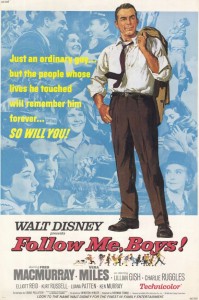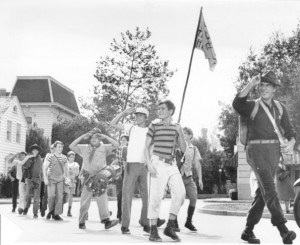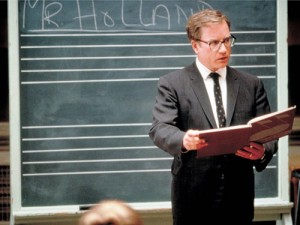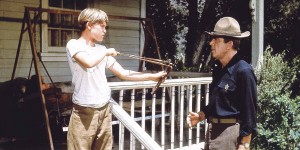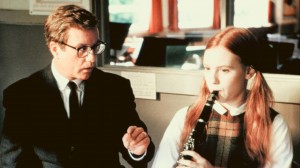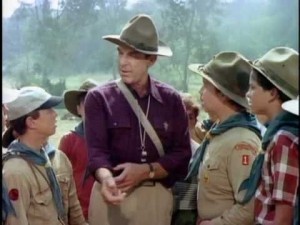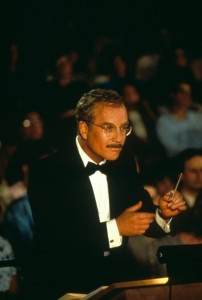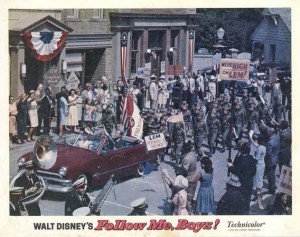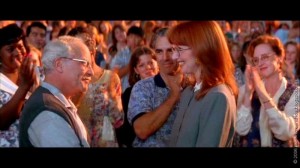100 Film Favorites – #34: Follow Me, Boys! / Mr. Holland’s Opus
(Norman Tokar, 1966 / Stephen Herek, 1995)
“Life is what happens to you while you’re busy making other plans.”
Today we come to the Countdown’s one and only double feature. I know this technically pushes the grand total to 101 Film Favorites, but if it makes it easier for you, you can just think of today’s “bonus” film as making up for the handful of short films and TV specials that snuck in.
So why did I choose to highlight two films in the same post? Well, because I just couldn’t rank one over the other…because they’re essentially the same movie, thirty years apart. Both films feature a protagonist who begins the story as a youngish man of around 30. In Follow Me, Boys! it’s Lemuel “Lem” Siddons, a member of a traveling band who stops off in a small town one day, deciding it’s time to settle down and pursue his dream of becoming a lawyer. In Mr. Holland’s Opus, the role is played by titular character Glenn Holland, also a professional musician, who dreams of dedicating his time to composing orchestral music.
Both men soon find their time occupied with other activities than the ones they had planned. At a town meeting dedicated to resolving the problem of juvenile delinquency, Lem peers over the shoulder of a woman in the row ahead to see that she has jotted down “Boy Scouts” as a possibility. Mostly to impress her, he stands and proposes starting a Boy Scout troop in the town. As no one else is jumping up to volunteer, Lem quickly finds himself the scoutmaster of the new troop.
Meanwhile, in the other film, Glenn takes a job as a music teacher at the local high school, primarily to earn money to accommodate his composing.
Lem and Glenn are soon more involved in their newfound vocations than they had expected. Lem rounds up the village boys to form a ragtag troop, and eventually recruits even the town’s biggest troublemaker, Whitey (Kurt Russell, in his first of many films with Disney). Whitey’s father is the town drunk, and when he ultimately succumbs to alcohol poisoning, Lem and his wife (the woman he had sought to impress at the town meeting) adopt the troubled boy as their own. Under Lem’s leadership, the boys grow together as a troop, and Whitey develops into a leader in his own right.
“Mr. Holland” likewise grows into his role as music teacher. He takes pride in helping struggling students, and uses rock & roll, that dread menace to society, to reach out to the youth of the day and encourage music appreciation. He sticks to his guns all the more when this rebellious approach offends the sensibilities of the uptight vice principal (William H. Macy). However, while Lem finds a son through Scouting, Glenn’s teaching drives him apart from his own family. His son, Cole, is born deaf. Angry that he cannot share the love of music (or an appreciation for his life’s work) with his child, Glenn opts to simply ignore Cole and throws himself into his involvement with the school, taking on responsibilities such as leading the marching band, orchestrating the annual school musical, and teaching behind-the-wheel classes in the summers.
And all the while, the clock ticks on.
As the years pass, many a Scout and many a music student pass under the tutelage of Lem and Glenn. With each new batch of young folks, the Scoutmaster and the bandleader grow a little older, and a little further from their original dreams.
Both men keep at their “new” callings for decades, and the times keep a-changing. During WWII, Lem is captured as a “spy” during an Army war game (his shaving mirror appears to be flashing a signal from camp), and the latest incarnation of “Troop 1” comes to rescue him, working as a group and even “capturing” a real tank in the process.
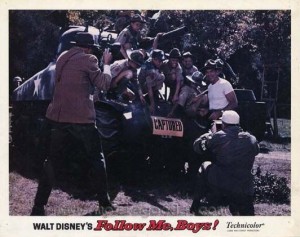 Glenn witnesses even more sweeping changes. Having begun at the recently-renamed John F. Kennedy High School in 1965, Mr. Holland has students die in Vietnam, and mourns the assassination of John Lennon. The passage of time is portrayed particularly well in Mr. Holland’s Opus, as each “jump” forward is accompanied by historical footage and music from the different periods: images of flower children and the moon landing give way to Ronald Reagan, and eventually the fall of the Berlin Wall.
Glenn witnesses even more sweeping changes. Having begun at the recently-renamed John F. Kennedy High School in 1965, Mr. Holland has students die in Vietnam, and mourns the assassination of John Lennon. The passage of time is portrayed particularly well in Mr. Holland’s Opus, as each “jump” forward is accompanied by historical footage and music from the different periods: images of flower children and the moon landing give way to Ronald Reagan, and eventually the fall of the Berlin Wall.
Finally, the fast-flying years catch up with our protagonists. Lem has led a dozen “Troop 1″s from 1930 to 1950, and Glenn has taught at JFK High for a whopping 30 years, 1965-1995. And yet, Lem is still not a lawyer, and Glenn has still not completed his “opus,” the symphony he has worked on only in spare moments throughout the film. The men have lived their lives, but they are unsure to what end. This ache is felt especially keenly by Glenn, who is unceremoniously ousted when his school cuts the music program. He feels as though he has failed to accomplish anything of substance.
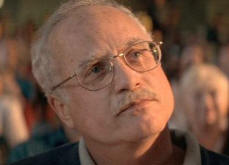 But wait, the movie’s not over! Both films end with the now gray-haired protagonist being summoned for a surprise gathering. In Lem’s case, the town has declared an official “Lemuel Siddons Day,” and a dozen troops-worth of Troop 1 boys (including the very first bugler, who still can’t play, and Whitey, now sporting a resplendent Marine uniform) have reunited to celebrate their long-serving Scoutmaster.
But wait, the movie’s not over! Both films end with the now gray-haired protagonist being summoned for a surprise gathering. In Lem’s case, the town has declared an official “Lemuel Siddons Day,” and a dozen troops-worth of Troop 1 boys (including the very first bugler, who still can’t play, and Whitey, now sporting a resplendent Marine uniform) have reunited to celebrate their long-serving Scoutmaster.
Similarly, the 60-something Mr. Holland is ushered into the school’s auditorium, where three decades of pupils have taken the stage for a very special performance – An American Symphony, the piece which Glenn has cobbled together over 30 years. The old bandleader steps up to the podium one last time to conduct his true opus, his students.
The theme of both films can be summed up by a line from John Lennon’s song “Beautiful Boy”: “Life is what happens to you while you’re busy making other plans” (Mr. Holland is audacious enough to include the song in its entirety). The lives that Lem and Glenn had planned for themselves gradually slip away as more and more time is consumed by their true life’s work, teaching. Even though they may have “failed” to accomplish their original dreams, Lem and Glenn help countless young people to achieve their own.
True, Mr. Holland’s Opus is essentially a remake of Follow Me, Boys!, but speaking as both a band kid and a Boy Scout, both films resonate strongly with me. Follow Me, Boys! takes the cake in the theme song department, with a great titular tune written by Disney mainstays the Sherman Brothers. But Mr. Holland’s Opus may technically be the better-made film. In addition to the well-executed “time passing” montages mentioned earlier, the focus on how Glenn’s relationship with his family changes as he becomes more involved with the functioning of the school keeps the narrative tight and emotionally charged. In contrast, Follow Me, Boys! occasionally seems episodic.
Nevertheless, both are touching films which capture, as the Follow Me, Boys! poster says, “all the happiness and heartache of being a hometown hero.” So get your tissues ready, ladies and gents. These rank up there with dog movies on the tearjerker scale.
Tidbits:
–Follow Me, Boys! was the last Disney film released during Walt Disney’s lifetime (it premiered only about two weeks before he died). It’s also one of the few films to use official trademarks of the Boy Scouts of America. Below is a brief introduction to a screening of Follow Me, Boys!, believed to be the last footage of Walt Disney before he died. (It also makes reference to Blackbeard’s Ghost and The Happiest Millionaire, both of which I’ve seen. Neither made the countdown, but I’d highly recommend Blackbeard’s Ghost).
This post is dedicated to Mr. Roy Holder, Burke’s own Mr. Holland, who led the Lake Braddock band program for 23 years, extending the school’s record to an unrivaled 30 years of consecutive “superior” ratings. When he retired in 2011, Mr. Holder received a Holland-style sendoff.
—
Brian Terrill is the host of television show Count Gauntly’s Horrors from the Public Domain. You can keep up with Brian’s 100 Film Favorites countdown here.


